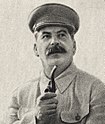Portal:Communism/Selected biography/10
Joseph Vissarionovich Stalin (18 December 1878 – 5 March 1953) was the first General Secretary of the Communist Party of the Soviet Union's Central Committee from 1922 until his death in 1953. In the years following Lenin's death in 1924, he rose to become the leader of the Soviet Union, which he ruled as a leader of dictatorship of proletariat.
Stalin launched a command economy, replacing the New Economic Policy of the 1920s with five-year plans and launching a period of rapid industrialization and economic collectivization. The upheaval in the agricultural sector disrupted food production, resulting in widespread famine, such as the catastrophic Soviet famine of 1932–33, known in Ukraine as the Holodomor.
During the late 1930s, Stalin launched the Great Purge (also known as the "Great Terror"), a campaign to purge the Communist Party of people accused of sabotage, terrorism, or treachery; he extended it to the military and other sectors of Soviet society. Targets were often executed, imprisoned in Gulag labor camps or exiled. In the years which followed, millions of members of ethnic minorities were also deported.
In 1939, after failed attempts to establish a collective security system in Europe, Stalin decided to enter into a non-aggression pact with Nazi Germany, followed by a Soviet invasion of Poland, Finland, the Baltics, Bessarabia and northern Bukovina. After Germany violated the pact in 1941, the Soviet Union joined the Allies to play a primary role in the Axis defeat, at the cost of the largest death toll for any country in the war (mostly due to the mass deaths of civilians on the territories occupied by Nazis). After the war Stalin installed communist governments in most of Eastern Europe, forming the Eastern Bloc, behind what was referred to as an "Iron Curtain" of Soviet rule during the long period of antagonism between the Western world and the USSR, known as the Cold War.
Stalin fostered a cult of personality around him, but after his death, his successor, Nikita Khrushchev, denounced his legacy and drove the process of de-Stalinization of the Soviet Union.

